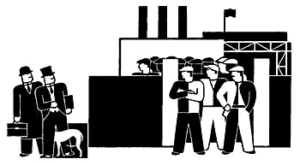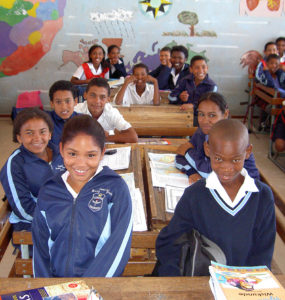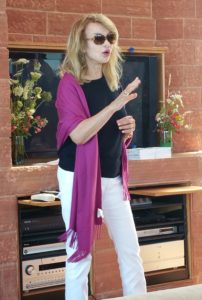A New Economic System For A World In Rapid Disintegration
 truth-out.org. September 2016. We live in ominously dangerous times. The world capitalist system — having fueled colonialism, imperialism and the constant intensification of labor power exploitation for roughly 500 years — now threatens the planet with an ecological collapse of unprecedented proportions. Unsustainable resource exploitation, water pollution (the transformation of lakes, rivers and oceans into garbage dumps) and massive economic inequality are at the root of the possibly irreversible collapse of industrial civilization. Meanwhile, however, too many of us remain caught up in abstract and ahistorical predictions of collapse that fail to offer an alternative realistic vision of a future socio-economic order.
truth-out.org. September 2016. We live in ominously dangerous times. The world capitalist system — having fueled colonialism, imperialism and the constant intensification of labor power exploitation for roughly 500 years — now threatens the planet with an ecological collapse of unprecedented proportions. Unsustainable resource exploitation, water pollution (the transformation of lakes, rivers and oceans into garbage dumps) and massive economic inequality are at the root of the possibly irreversible collapse of industrial civilization. Meanwhile, however, too many of us remain caught up in abstract and ahistorical predictions of collapse that fail to offer an alternative realistic vision of a future socio-economic order.
Simultaneously, the phenomenon of global warming, driven mainly by the dynamics and contradictions of a fossil-based economy, has prepared the soil for the eruption of new sources of conflict with the manifestation of historically unique destabilizing social forces. Climate change directly threatens billions of people and most other beings — besides the occasional cockroach, diadem or tardigrade — with outright extinction brought on by droughts, floods and other “natural” disasters.
Nonetheless, the catastrophic scenario sketched out behind the operations of global capitalism does not merely represent the other side of a wild socio-economic system bent on constant and abstract growth in pursuit of ever greater rates of profit. The so-called Golden Age of capitalism ended decades ago and the system has now run into a brick wall, as it appears to have reached a point where it is no longer capable of sustaining a constant momentum of growth to keep the economy reproducing itself at a pace that generates higher standards of living for the next generation.
Indeed, the productivity rates in the advanced industrialized regions of the world (such as the US, Europe and Japan) since the eruption of the financial crisis of 2007-08 are far slower than those of previous decades, thereby confirming the claims of various experts who argue that we have reached the end of the age of growth.
Moreover, in spite of all the talk about the marvelous and awe-inspiring accomplishments of the high-tech revolution, these innovations pale in comparison to the innovations of the Industrial Revolution. The new technologies reach billions of people, generating mythical fortunes for founders and investors, but increasingly employ only a handful of privileged workers. In the meantime, the problems of massive unemployment, increased inequality, growing economic insecurity, and dangerous levels of public and corporate debt are mounting.
In this context, the present crisis facing the world economy as a whole “consists precisely in the fact,” as Antonio Gramsci put it in his Prison Notebooks, “that the old is dying and the new cannot be born,” and all of the above represent the “morbid symptoms” of this antinomy that the great Italian revolutionary underscored as being part of this interregnum. Read more
How Schools Use Language As A Way To Exclude Children
Kenyan author Ngũgĩ wa Thiong’o once described language as “the most important vehicle through which that [colonial] power fascinated and held the soul prisoner”.
He illustrated this with a disturbing account of receiving corporal punishment, being fined and wearing a “plate around the neck with inscriptions such as I AM STUPID or I AM A DONKEY”. His “crime”? Speaking Gikuyu at his English medium school.
Today, decisions about which language resources should count in schooling – as the language of instruction, a subject, or a legitimate language for learning – continue to be informed by the relationships between language and power. Schools and universities in post-colonial contexts still operate within the logic of coloniality.
These realities have been thrown into sharp relief by revelations that some South African schools discipline their pupils for speaking any language but English (or Afrikaans) while on school grounds. At Cape Town’s Sans Souci High School for Girls, pupils obtain “losses” (or demerits) for a range of “offences” – like being caught speaking isiXhosa. For many of Sans Souci’s pupils, this is their home language.
Sadly this problem isn’t unique to South Africa. It’s been seen in other post-colonial contexts like Nigeria, Kenya and Zimbabwe. Nigerian novelist Chimamanda Adichie has spoken about not having the opportunity to learn Igbo proficiently at school. This, she says, left her with no option but to write exclusively in English.
These girls’ stories have foregrounded the crucial issue of language in processes of assimilation and exclusion. Over the past ten years there has been a major shift in our understandings of language, bilingualism and bilingual education which show the learning advantages of using more than one language in the classroom for learning. Read more
Avoiding Extinction: The Way Out Of Climate Change
For the first time ever, humans are dominating planet Earth. We are changing the basic metabolism of the planet: the composition of gases in the atmosphere, its bodies of water, and the complex web of species that makes life on Earth. What will come next?
We see that the changes we are precipitating in the atmosphere are fundamental and can lead to disruptions in climate and global warming. Both the North and the South Poles are melting. Water expands when it is heated. Since the seas are warming, sea level is rising all over the world. This irrevocable upward trend is well documented: slowly but surely the rising waters will sink most island states. There are 43 island states in the United Nations representing about 23% of the global vote and most or all could disappear soon under the warming seas.
The current shift in climate patterns threatens many species. It has allowed for the spread of insects that are migrating to areas they did not previously inhabit, bringing with them a variety of vector- borne illnesses. For example, new outbreaks of malaria in Africa are on the rise. Humans are also shifting ground. The UN reports that 21 million people are reportedly migrating due to drought and other climate change induced conditions, and the numbers are increasing rapidly (http://newsroom.unfccc.int/unfccc-newsroom/human-mobility-and-the-paris-agreement/). The 2014 migration of one million people into the EU is causing considerable political stress leading to anti-immigration candidates in German, UK, and US elections, and some anticipate that it could damage the fabric of Western democracy.
In the U.S., the consequences are less extreme but still evident: the mighty Colorado River is drying up, prompting orders to turn off farm water in several states. Lake Meads waters in Nevada are exhibiting record lows, threatening the main supply of water to Las Vegas. Wild fires from drought conditions have multiplied and have spread rapidly around the region and in California since 2006.
The world is aware of the connection that scientists postulate between climate change and the use of fossil energy. The largest segment of carbon emissions, about 45% of the global emissions of CO2, originate in the worlds power plant infrastructure, 87% of which are fossil fuel plants that produce the overwhelming majority of the worlds electricity. This power plant infrastructure represents a value worth $45-55 trillion according to the International Energy Agency (IEA), which is about the scope of the worlds economic output. New forms of clean energy are emerging, such as wind farms in Scotland and solar farms in Spain and the US, in an attempt to forestall carbon emissions. But the process is necessarily slow since the worlds fossil power plant infrastructure is comparable in monetary value to the worlds entire GDP, and changing this infrastructure can take decades. Transforming the power plant infrastructure is too slow to avert the potential catastrophes that are anticipated in the next 1020 years. What is the solution?
Below I propose a realistic plan that involves market solutions in industrial and developing nations which will simultaneously resolve the problems of economic development and climate change and the global climate negotiations. But climate change is just one of several global environmental areas that are in crisis today. Biodiversity is another; industrialization and climate warming threaten the world’s ecosystems. Endangered species include sea-mammals, birds such as cockatoos, polar bears, and marine life such as coral, saw-fish, whales, sharks, dogfish, sea turtles, skates, grouper, seals, rays, bass, elephants, and even primates, our cousins in evolution. Scientists know that we are in the midst of the sixth largest extinction of biodiversity in the history of our planet, and that the scope of extinction is so large that 75% of all known species are at risk today. The UN Millennium Report documents rates of extinction at 1,000 times higher than fossil records. The current extinction event is the largest following the dinosaurs extinction that took place 60 to 65 million years ago. But todays extinction event is unique in that it is caused by human activity. And it puts our own species at risk. There is a warning signal worth bringing up: all major recorded planetary extinctions were related to changes in climate conditions. Through industrialization we have created environmental conditions that could threaten our own species survival. 99.9% of all species that ever existed are now extinct.
Are we next?
Will humans survive?
The issue now is how to avoid extinction. Read more
Can Economics Value Human Survival? ~ An Interview With Graciela Chichilnisky
 Climate change threatens human survival and the existing economic arrangements and values are directly responsible for this sad state of affairs, argues Graciela Chichilnisky, author of the Kyoto Protocol Carbon Market and a world authority on climate change, in the interview that follows. Moreover, Professor Chichilnisky thinks that a new global economy based on “green capitalism” is not only possible but absolutely essential for the future of the planet. Graciela Chichilnisky is Professor of Economics and of Statistics at Columbia University, Visiting Professor of Economics at Stanford, and co-founder and CEO of Global Thermostat.
Climate change threatens human survival and the existing economic arrangements and values are directly responsible for this sad state of affairs, argues Graciela Chichilnisky, author of the Kyoto Protocol Carbon Market and a world authority on climate change, in the interview that follows. Moreover, Professor Chichilnisky thinks that a new global economy based on “green capitalism” is not only possible but absolutely essential for the future of the planet. Graciela Chichilnisky is Professor of Economics and of Statistics at Columbia University, Visiting Professor of Economics at Stanford, and co-founder and CEO of Global Thermostat.
Marcus Rolle: Professor Chichilnisky, can you discuss what might be some of the long-term effects of climate change on global economic activity?
Graciela Chichilnisky: The effects of climate change on global economic activity are profound and widespread and can be counted in the trillions of dollars, including losses of property from flooding, droughts and fires and other catastrophic events such as typhoons and tornadoes that have become more intense, more frequent and more volatile due to a warmer atmosphere and hydrosphere, which contain more energy. Think of New York City with three Sandy Superstorms per year. Firms and schools will be closed for most of the year, the police will be out of action, there will be no electricity, cars will be floating in the streets, etc. In sum, New York will not be a working city. The effects are incalculable. But the problem is larger than the dollar value of storms and floods and weather events because of the hundreds of millions or billions of lives that are either ruined or lost and the incalculable damage done to our political and social institutions and structures that make up the fabric of human civilization.
MR: There are several studies indicating that global warming impacts adversely on productivity and impacts negatively on global GNP per capita. Aren’t we throwing money around by not addressing global warming?
GC: Climate change will have indeed serious adverse effects on the economy and, in a recent OECD study, the value of losses of property in the world’s leading cities alone are in the trillions of dollars, including those in Miami Florida and Shanghai China. So, in this sense, we are definitely throwing money around. In reality, however, the whole concept of GDP and of economic value that we use today is suspect and many expect it to change sometime soon. I do.
MR: Developing countries are most likely to absorb much of the losses caused by climate change. If so, how will this development impact on migration flows to developed countries?
GC: I believe that among the first and worst effects of climate change that we will witness will be massive migration movements of tens or even up to hundreds of millions of people from poor nations badly affected by climate change into rich nations and, subsequently, the manifestation of extremist political processes in the latter nations as a result of these migration waves. Indeed, the process has already started, and, the war in Syria, which caused the massive migration of over 1million people into Europe, came in the aftermath of an unprecedented in terms of severity four-year drought that left millions desperate, with no jobs, food, or hope, forcing them in turn to flee for their lives. These unprecedented migration waves of refugees have already led, as I predicted in an earlier article, to political extremism both in Europe and the United States. Brexit is perhaps the most direct and explicit consequence of these developments, but there are others as well. We are witnessing the direct political consequences of radical extremism on the political stage in Europe and the United States right now. Climate change means that this pattern will continue and amplify and it can easily lead to the destruction of Western democratic values and of our most important governance institutions. This, in my view, is one of the most immediate, direct, dangerous and destructive effect of climate change as our entire social fabric and institutions, the very foundations of human societies as we know them, are at risk. All this can happen — and is in fact already happening very quickly –, and it can be, and probably will be, devastating to human societies. Humans will not disappear and become extinct without violence and conflicts and wars can be expected. Of course, most people have trouble imagining how this will develop as the physical survival of some human groups is still likely, but not when it comes to human civilization itself if the trend continues and prevails. Think of the follow-up effect of the massive asteroid that is believed to have hit Mexico about 60 million years ago and to have led to the disappearance of the dinosaurs, which were a globally dominant species at the time as we are now. Massive dust clouds stopped sun rays and the earths’ main source of energy. Millions perished. It is generally thought that the dinosaurs who could fly and overcame the lethal dust created by the impact of the asteroid are now still around and can be seen as birds, for example chickens. Will humans become the chickens of the future? Possibly. Read more
God wil het! Reizen in het spoor van de kruisvaarders
De historische importantie van de Kruistochten die tussen de 11e en de 15e eeuw plaats vonden in Europa en het Midden-Oosten wordt in het huidige tijdperk doorgaans door Westerse historici en politici onderschat.
Lejo Siepe en Robert Mulder volgden enkele jaren geleden het spoor van de eerste Kruistocht en ontdekten dat met name in de Arabische wereld de herinneringen aan de Kruistochten nog altijd levendig zijn. In de hoofden van veel moslims is deze historische gebeurtenis actueler dan ooit. De islamitische wereld voelt zich bedreigd door het Westen. Het Westen voelt zich bedreigd door de islamitische wereld. Een geschiedenis herhaalt zich. Heden ten dage worden in zowel de christelijke stromingen als in de islam de geloofsstellingen weer betrokken, gebaseerd op oude mythen, sagen en legendes. Hebben de Kruistochten in dit verband meer dan een symbolische betekenis?
In dit reisverslag langs de route van de eerste Kruistocht hebben Lejo Siepe en Robert Mulder geprobeerd antwoord te vinden op de vraag of er sprake is van een nieuw vijandsbeeld gebaseerd op oude vooroordelen. De auteurs spraken in Europa en in het Midden Oosten met vooraanstaande historici, schrijvers, filosofen en geestelijken (onder andere Amos Oz, Amin Maalouf, Sadik Al Azm, Benjamin Kedar, Halil Berktay) over de actuele invloed van de Kruistochten op onze moderne geschiedenis en de onverminderd voortdurende godsdienstige conflicten tussen moslims, joden en christenen.
Inhoudsopgave
Hoofdstuk Een – Reizen in het spoor der kruisvaarders – Inleiding
Hoofdstuk Twee – Duitsland: de vijanden van God
Hoofdstuk Drie – Hongarije: de koning der boeken
Hoofdstuk Vier – De Balkan: een eeuwig strijdtoneel
Hoofdstuk Vijf – Bulgarije
Hoofdstuk Zes – Constantinopel: in het kamp van de vijand
Hoofdstuk Zeven – Nicaea en Dorylaeum: Sterf dan honden!
Hoofdstuk Acht – Cappadocië: De vlakte des doods
Hoofdstuk Negen – Antiochië: het verraad van het harnasmasker
Hoofdstuk Tien – Antiochië: een teken van God
Hoofdstuk Elf – Syrie: twee grote leiders voor een geweldig volk
Hoofdstuk Twaalf – Libanon: het land van ruines
Hoofdstuk Dertien – Israel: het land van belofte
Hoofdstuk Veertien – Jeruzalem: God wil het!





